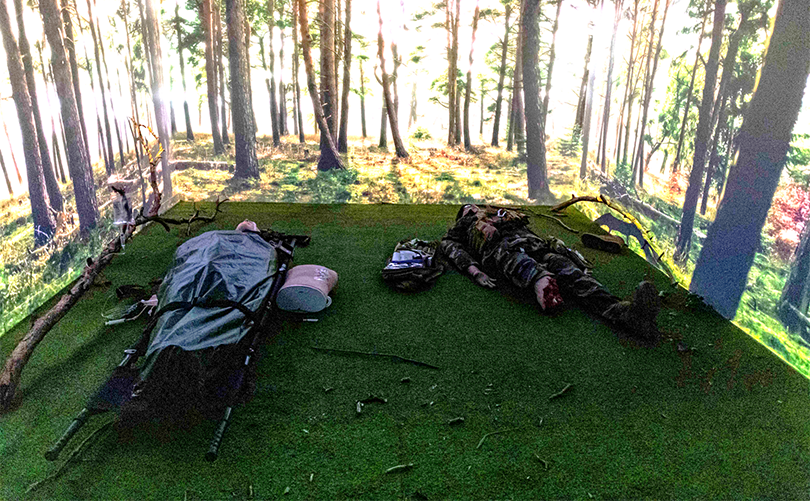Travel through time and space: RSU's use of innovative technologies in studies
Moving around in time and space is certainly an issue for many students, to balance their intensive studies and their demanding work commitments with family and personal interests. While scientists are still working on this fundamental issue, the Rīga Stradiņš University (RSU) Medical Education Technology Centre (METC) offers students the possibility to move around different rooms with a single button by introducing two innovative solutions – a virtual patient platform and an immersive augmented reality room.

The virtual patient platform enables students to learn the algorithms of different clinical processes and solve clinical cases themselves; to diagnose, care for patients, and treat patients according to a virtual scenario. Students can access the virtual platform remotely by connecting to a cloud server and entering an environment where a virtual ward with a patient and all the necessary medical devices are available and can be used to run the scenario. This platform allows students to independently test and strengthen their knowledge by applying it while running realistic clinical case scenarios. The platform is also used for training students on-site in simulated scenarios where an actor plays the role of the main patient. Since actors cannot physically change their vitals to match complex clinical scenarios, the virtual platform provides a digital solution wherein the required vitals are displayed on the devices used in the given scenario (lung ventilators, anaesthetic machines, and so on).
The second innovation is an immersive augmented reality room, which has already been used in several simulation activities and is highly appreciated by students and lecturers alike. The immersive room contains a multi-projection system with the ability to create and visualise different environments appropriate to the situations foreseen in each simulation. With such a system, it is possible to create environments that would otherwise be impossible to create at the METC (e.g., a forest or battlefield conditions). At the same time, the visual representation of different spaces - such as a hospital ward, a school classroom or a market pavilion - can be easily and infinitely changed to suit the needs of the simulation scenario. According to METC's Head of Simulation Technology Mārtiņš Ļuļļa, ‘this solution allows for much more realistic simulation exercises, ensuring that the environment is believable and consistent with the scenario.’
'Visual and audio special effects allow students to immerse themselves in the atmosphere and prepares them for the real world. All in all, digital solutions provide a strong support for simulation-based medical education, which helps to improve the quality of the study process at Rīga Stradiņš University.'
The METC’s immersive environment is already being used extensively in military medical training, where different battlefield environments are depicted in scenarios. Immersive rooms are also used in simulation cycles for residents, where simulations are performed in different environments, such as an epileptic seizure in a library or a newborn being examined at home. METC Project Team Leader Evita Grigoroviča adds that by successfully using both EU funding* and the RSU budget, and by introducing state-of-the-art technologies, the METC has developed the infrastructure to ensure the highest standards in simulation-based education and thus compete with the leading simulation centres in Europe. The METC's future plans include intensive development of the integration of innovative technologies in the study process, expanding the scope of the visual and audio features of the inclusive augmented reality space, and developing original scenarios for the virtual patient platform thus improving the quality of the simulations and the range of services provided by the METC.
* The virtual patient platform, the immersive room, as well as the scenarios adapted to technologies have been developed as part of the ESF project Improvement of the management process and study content modernisation at Rīga Stradiņš University (No 8.2.3.0/18/A/011), under the Specific Support Objective 8.2.3 To ensure better governance in higher education institutions.

Related news
 Time capsule laid at ceremony for construction of new RSU sports complexFor Students, Consolidation, For RSU Employees, Internal consolidation, Development
Time capsule laid at ceremony for construction of new RSU sports complexFor Students, Consolidation, For RSU Employees, Internal consolidation, Development


